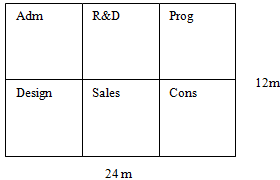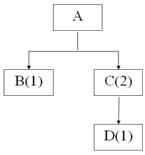Problem 1 Facility Location
A big retail chain needs to find the best location to build new warehouse. The new warehouse will mainly serve on a weekly basis 8 stores in the northeast.
Using Euclidian distances compute the center of gravity and calculate the total transportation cost.
The following information has been collected for the 8 stores:
|
|
Rate
$/Ton Mile
|
Tons
|
Coordinates
|
|
|
|
|
x
|
y
|
|
A
|
1.30
|
300
|
700
|
1200
|
|
B
|
0.95
|
400
|
250
|
600
|
|
C
|
0.85
|
600
|
225
|
825
|
|
D
|
1.20
|
323
|
600
|
500
|
|
E
|
1.30
|
230
|
1050
|
1200
|
|
F
|
0.80
|
120
|
800
|
300
|
|
G
|
0.90
|
400
|
925
|
975
|
|
H
|
1.23
|
300
|
1000
|
1080
|
Problem 2 Facility layout
Assume the following office plan among different departments.

The average number of contacts among departments per week is indicated below:
|
|
Adm
|
R&D
|
Prog
|
Design
|
Sales
|
Cons
|
|
Adm
|
-
|
2
|
8
|
6
|
20
|
10
|
|
R&D
|
|
-
|
30
|
50
|
40
|
20
|
|
Prog
|
|
|
-
|
50
|
10
|
70
|
|
Design
|
|
|
|
-
|
20
|
30
|
|
Sales
|
|
|
|
|
-
|
50
|
|
Cons
|
|
|
|
|
|
-
|
Compute the total "load-distance" LD score for the current solution, and then try to find an improved layout.
Problem 3 Materials Requirements Planning
A manufacturing plant produces an end-item A, according to the following bill of materials:

The MPS for the end-item A is given in table 1. The manufacturing / assembly lead times, the lot sizing rules, and the current on-hand inventory for all constituting items are given in table 2. There are scheduled receipts for item C at week 1 (100 pieces) and for item D at week 3 (80 pieces).
Table 1: MPS Quantities
|
MPS Quantities
|
1
|
2
|
3
|
4
|
5
|
6
|
7
|
8
|
9
|
10
|
|
Gross Requirements (Α)
|
-
|
30
|
-
|
50
|
-
|
200
|
-
|
120
|
180
|
60
|
Table 2: Lead times, lot sizing rules, on-hand inventory
|
Item
|
Lead Time
|
Lot sizing rule
|
On-hand inventory
|
|
A
|
2 weeks
|
Lot-for-lot
|
40
|
|
B
|
1 week
|
Fixed Order Period = 3 weeks
|
20
|
|
C
|
2 weeks
|
Lot-for-lot
|
20
|
|
D
|
3 weeks
|
Fixed Order Quantity = 500 units
|
300
|
Determine the material requirement plan (fill the following tables).
|
Item: A
|
Production Lead Time: 2 weeks
|
Lot size rule: Lot-for-Lot
|
|
Week No.
|
1
|
2
|
3
|
4
|
5
|
6
|
7
|
8
|
9
|
10
|
|
Gross Requirements
|
|
|
|
|
|
|
|
|
|
|
|
Adjusted Scheduled Receipts
|
|
|
|
|
|
|
|
|
|
|
|
Projected on-hand 40
|
|
|
|
|
|
|
|
|
|
|
|
Net Requirements
|
|
|
|
|
|
|
|
|
|
|
|
Planned order receipt
|
|
|
|
|
|
|
|
|
|
|
|
Planned order release
|
|
|
|
|
|
|
|
|
|
|
|
|
|
|
|
|
|
|
|
|
|
|
|
Item: B
|
Production Lead Time: 1 week
|
Lot size rule: FOP (P=3 weeks)
|
|
Week No.
|
1
|
2
|
3
|
4
|
5
|
6
|
7
|
8
|
9
|
10
|
|
Gross Requirements
|
|
|
|
|
|
|
|
|
|
|
|
Adjusted Scheduled Receipts
|
|
|
|
|
|
|
|
|
|
|
|
Projected on-hand 20
|
|
|
|
|
|
|
|
|
|
|
|
Net Requirements
|
|
|
|
|
|
|
|
|
|
|
|
Planned order receipt
|
|
|
|
|
|
|
|
|
|
|
|
Planned order release
|
|
|
|
|
|
|
|
|
|
|
|
|
|
|
|
|
|
|
|
|
|
|
|
Item: C
|
Production Lead Time: 2 week
|
Lot size rule: Lot-for-Lot
|
|
Week No.
|
1
|
2
|
3
|
4
|
5
|
6
|
7
|
8
|
9
|
10
|
|
Gross Requirements
|
|
|
|
|
|
|
|
|
|
|
|
Adjusted Scheduled Receipts
|
|
|
|
|
|
|
|
|
|
|
|
Projected on-hand 20
|
|
|
|
|
|
|
|
|
|
|
|
Net Requirements
|
|
|
|
|
|
|
|
|
|
|
|
Planned order receipt
|
|
|
|
|
|
|
|
|
|
|
|
Planned order release
|
|
|
|
|
|
|
|
|
|
|
|
|
|
|
|
|
|
|
|
|
|
|
|
Item: D
|
Production Lead Time: 3 weeks
|
Lot size rule: FOQ (Q=500)
|
|
Week No.
|
1
|
2
|
3
|
4
|
5
|
6
|
7
|
8
|
9
|
10
|
|
Gross Requirements
|
|
|
|
|
|
|
|
|
|
|
|
Adjusted Scheduled Receipts
|
|
|
|
|
|
|
|
|
|
|
|
Projected on-hand 300
|
|
|
|
|
|
|
|
|
|
|
|
Net Requirements
|
|
|
|
|
|
|
|
|
|
|
|
Planned order receipt
|
|
|
|
|
|
|
|
|
|
|
|
Planned order release
|
|
|
|
|
|
|
|
|
|
|
|
|
|
|
|
|
|
|
|
|
|
|